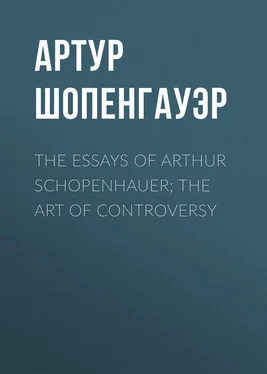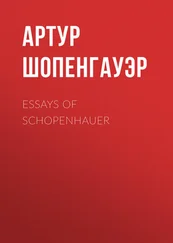Артур Шопенгауэр - The Essays of Arthur Schopenhauer; the Art of Controversy
Здесь есть возможность читать онлайн «Артур Шопенгауэр - The Essays of Arthur Schopenhauer; the Art of Controversy» — ознакомительный отрывок электронной книги совершенно бесплатно, а после прочтения отрывка купить полную версию. В некоторых случаях можно слушать аудио, скачать через торрент в формате fb2 и присутствует краткое содержание. Жанр: Философия, literature_19, foreign_antique, foreign_prose, на английском языке. Описание произведения, (предисловие) а так же отзывы посетителей доступны на портале библиотеки ЛибКат.
- Название:The Essays of Arthur Schopenhauer; the Art of Controversy
- Автор:
- Жанр:
- Год:неизвестен
- ISBN:нет данных
- Рейтинг книги:3 / 5. Голосов: 1
-
Избранное:Добавить в избранное
- Отзывы:
-
Ваша оценка:
- 60
- 1
- 2
- 3
- 4
- 5
The Essays of Arthur Schopenhauer; the Art of Controversy: краткое содержание, описание и аннотация
Предлагаем к чтению аннотацию, описание, краткое содержание или предисловие (зависит от того, что написал сам автор книги «The Essays of Arthur Schopenhauer; the Art of Controversy»). Если вы не нашли необходимую информацию о книге — напишите в комментариях, мы постараемся отыскать её.
The Essays of Arthur Schopenhauer; the Art of Controversy — читать онлайн ознакомительный отрывок
Ниже представлен текст книги, разбитый по страницам. Система сохранения места последней прочитанной страницы, позволяет с удобством читать онлайн бесплатно книгу «The Essays of Arthur Schopenhauer; the Art of Controversy», без необходимости каждый раз заново искать на чём Вы остановились. Поставьте закладку, и сможете в любой момент перейти на страницу, на которой закончили чтение.
Интервал:
Закладка:
We must always keep the subject of one branch of knowledge quite distinct from that of any other. To form a clear idea of the province of Dialectic, we must pay no attention to objective truth, which is an affair of Logic; we must regard it simply as the art of getting the best of it in a dispute , which, as we have seen, is all the easier if we are actually in the right. In itself Dialectic has nothing to do but to show how a man may defend himself against attacks of every kind, and especially against dishonest attacks; and, in the same fashion, how he may attack another man's statement without contradicting himself, or generally without being defeated. The discovery of objective truth must be separated from the art of winning acceptance for propositions; for objective truth is an entirely different matter: it is the business of sound judgment, reflection and experience, for which there is no special art.
Such, then, is the aim of Dialectic. It has been defined as the Logic of appearance; but the definition is a wrong one, as in that case it could only be used to repel false propositions. But even when a man has the right on his side, he needs Dialectic in order to defend and maintain it; he must know what the dishonest tricks are, in order to meet them; nay, he must often make use of them himself, so as to beat the enemy with his own weapons.
Accordingly, in a dialectical contest we must put objective truth aside, or, rather, we must regard it as an accidental circumstance, and look only to the defence of our own position and the refutation of our opponent's.
In following out the rules to this end, no respect should be paid to objective truth, because we usually do not know where the truth lies. As I have said, a man often does not himself know whether he is in the right or not; he often believes it, and is mistaken: both sides often believe it. Truth is in the depths. At the beginning of a contest each man believes, as a rule, that right is on his side; in the course of it, both become doubtful, and the truth is not determined or confirmed until the close.
Dialectic, then, need have nothing to do with truth, as little as the fencing master considers who is in the right when a dispute leads to a duel. Thrust and parry is the whole business. Dialectic is the art of intellectual fencing; and it is only when we so regard it that we can erect it into a branch of knowledge. For if we take purely objective truth as our aim, we are reduced to mere Logic; if we take the maintenance of false propositions, it is mere Sophistic; and in either case it would have to be assumed that we were aware of what was true and what was false; and it is seldom that we have any clear idea of the truth beforehand. The true conception of Dialectic is, then, that which we have formed: it is the art of intellectual fencing used for the purpose of getting the best of it in a dispute; and, although the name Eristic would be more suitable, it is more correct to call it controversial Dialectic, Dialectica eristica .
Dialectic in this sense of the word has no other aim but to reduce to a regular system and collect and exhibit the arts which most men employ when they observe, in a dispute, that truth is not on their side, and still attempt to gain the day. Hence, it would be very inexpedient to pay any regard to objective truth or its advancement in a science of Dialectic; since this is not done in that original and natural Dialectic innate in men, where they strive for nothing but victory. The science of Dialectic, in one sense of the word, is mainly concerned to tabulate and analyse dishonest stratagems, in order that in a real debate they may be at once recognised and defeated. It is for this very reason that Dialectic must admittedly take victory, and not objective truth, for its aim and purpose.
I am not aware that anything has been done in this direction, although I have made inquiries far and wide. 8 8 Diogenes Laertes tells us that among the numerous writings on Rhetoric by Theophrastus, all of which have been lost, there was one entitled [Greek: Agonistikon taes peri tous eristikous gogous theorias.] That would have been just what we want.
It is, therefore, an uncultivated soil. To accomplish our purpose, we must draw from our experience; we must observe how in the debates which often arise in our intercourse with our fellow-men this or that stratagem is employed by one side or the other. By finding out the common elements in tricks repeated in different forms, we shall be enabled to exhibit certain general stratagems which may be advantageous, as well for our own use, as for frustrating others if they use them.
What follows is to be regarded as a first attempt.
THE BASIS OF ALL DIALECTIC
First of all, we must consider the essential nature of every dispute: what it is that really takes place in it.
Our opponent has stated a thesis, or we ourselves, – it is all one. There are two modes of refuting it, and two courses that we may pursue.
I. The modes are (1) ad rem , (2) ad hominem or ex concessis . That is to say: We may show either that the proposition is not in accordance with the nature of things, i.e., with absolute, objective truth; or that it is inconsistent with other statements or admissions of our opponent, i.e., with truth as it appears to him. The latter mode of arguing a question produces only a relative conviction, and makes no difference whatever to the objective truth of the matter.
II. The two courses that we may pursue are (1) the direct, and (2) the indirect refutation. The direct attacks the reason for the thesis; the indirect, its results. The direct refutation shows that the thesis is not true; the indirect, that it cannot be true.
The direct course admits of a twofold procedure. Either we may show that the reasons for the statement are false ( nego majorem, minorem ); or we may admit the reasons or premisses, but show that the statement does not follow from them ( nego consequentiam) ; that is, we attack the conclusion or form of the syllogism.
The direct refutation makes use either of the diversion or of the instance .
(a) The diversion . – We accept our opponent's proposition as true, and then show what follows from it when we bring it into connection with some other proposition acknowledged to be true. We use the two propositions as the premisses of a syllogism giving a conclusion which is manifestly false, as contradicting either the nature of things, 9 9 If it is in direct contradiction with a perfectly undoubted, truth, we have reduced our opponent's position ad absurdum .
or other statements of our opponent himself; that is to say, the conclusion is false either ad rem or ad hominem . 10 10 Socrates, in Hippia Maj. et alias .
Consequently, our opponent's proposition must have been false; for, while true premisses can give only a true conclusion, false premisses need not always give a false one.
(b) The instance , or the example to the contrary. – This consists in refuting the general proposition by direct reference to particular cases which are included in it in the way in which it is stated, but to which it does not apply, and by which it is therefore shown to be necessarily false.
Such is the framework or skeleton of all forms of disputation; for to this every kind of controversy may be ultimately reduced. The whole of a controversy may, however, actually proceed in the manner described, or only appear to do so; and it may be supported by genuine or spurious arguments. It is just because it is not easy to make out the truth in regard to this matter, that debates are so long and so obstinate.
Nor can we, in ordering the argument, separate actual from apparent truth, since even the disputants are not certain about it beforehand. Therefore I shall describe the various tricks or stratagems without regard to questions of objective truth or falsity; for that is a matter on which we have no assurance, and which cannot be determined previously. Moreover, in every disputation or argument on any subject we must agree about something; and by this, as a principle, we must be willing to judge the matter in question. We cannot argue with those who deny principles: Contra negantem principia non est disputandum .
Читать дальшеИнтервал:
Закладка:
Похожие книги на «The Essays of Arthur Schopenhauer; the Art of Controversy»
Представляем Вашему вниманию похожие книги на «The Essays of Arthur Schopenhauer; the Art of Controversy» списком для выбора. Мы отобрали схожую по названию и смыслу литературу в надежде предоставить читателям больше вариантов отыскать новые, интересные, ещё непрочитанные произведения.
Обсуждение, отзывы о книге «The Essays of Arthur Schopenhauer; the Art of Controversy» и просто собственные мнения читателей. Оставьте ваши комментарии, напишите, что Вы думаете о произведении, его смысле или главных героях. Укажите что конкретно понравилось, а что нет, и почему Вы так считаете.












